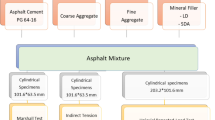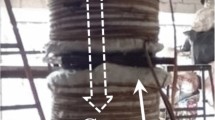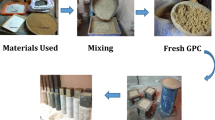Abstract
The typical treatment of waste plastics has become a global environmental problem. In light of recent developments, waste plastics used as asphalt modifiers offer an efficient approach to solve this problem. This paper studied the effects of three kinds of waste plastic-modified asphalts (WPMA), with polypropylene (PP), polyethylene (PE) and ethylene-vinyl acetate copolymer (EVA) as their respective modifiers, on the conventional asphalt performance. Furthermore, an orthogonal experimental design (OED) was used to determine the preparation parameters of WPMA. Thereafter, thermogravimetric-differential scanning calorimetry (TG-DSC) and Fourier transform infrared spectroscopy (FTIR) were employed to expound the mechanism of WPMA. It was then subsequently ascertained that the optimum preparation parameters of PP-modified asphalt (PPMA) and PE-modified asphalt (PEMA) were 170 °C, 3000 rpm, and 30 min, while the optimum preparation parameters of EVA-modified asphalt (EVAMA) were 180 °C, 3000 rpm, and 30 min. In addition, WPMA displayed better high-temperature performance and are inherently more suitable for pavement in high-temperature regions. Ultimately, this study will effectively solve the disposal of waste plastic and promote the research and application of WPMA in the future.


















Similar content being viewed by others
Data availability
All the data used in this article are in the manuscript.
References
Abed AH, Bahia HU (2020) Enhancement of permanent deformation resistance of modified asphalt concrete mixtures with nano-high density polyethylene. Construct Build Mater 236:117604
Aldagari S, Kabir SF, Lamanna A, Fini EH (2022) Functionalized waste plastic granules to enhance sustainability of bituminous composites. Resour Conserv Recycl 183
Al-Hadidy A (2018) Engineering behavior of aged polypropylene-modified asphalt pavements. Construct Build Mater 191:187–192
Angelone S, Cauhapé Casaux M, Borghi M, Martinez FO (2015) Green pavements: reuse of plastic waste in asphalt mixtures. Mater Struct 49(5):1655–1665
Arabani M, Pedram M (2016) Laboratory investigation of rutting and fatigue in glassphalt containing waste plastic bottles. Construct Build Mater 116:378–383
Costa L, Fernandes S, Silva H, Oliveira J (2017) Study of the interaction between asphalt and recycled plastics in new polymer modified binders (PMB). Ciência Tecnologia Dos Materiais 29(1):e192–e197
Costa LM, Silva H, Oliveira JR, Fernandes SR (2013) Incorporation of waste plastic in asphalt binders to improve their performance in the pavement. Int J Pavement Res Technol 6(4):457–464
Dalhat M, Al-Abdul Wahhab H (2017a) Performance of recycled plastic waste modified asphalt binder in Saudi Arabia. Int J Pavement Eng 18(4):349–357
Dalhat MA, Adesina AY (2020) Utilization of micronized recycled polyethylene waste to improve the hydrophobicity of asphalt surfaces. Construct Build Mater 240
Enfrin M, Giustozzi F (2022) Recent advances in the construction of sustainable asphalt roads with recycled plastic. Polym Int 71(12):1376–1383
Fang C, Liu P, Yu R, Liu X (2014) Preparation process to affect stability in waste polyethylene-modified bitumen. Construct Build Mater 54:320–325
Fang C, Zhou S, Zhang M, Zhao S (2009) Modification of waterproofing asphalt by PVC packaging waste. J Vinyl Addit Technol 15(4):229–233
Ghilan DMA, Teomete E (2019) Effect of surface treated industrial waste plastics on the mechanical properties of cement composite. Cement Wapno Beton 24(1):21
Ghuzlan KA, Al-Khateeb GG, Qasem Y (2013) Rheological properties of polyethylene-modified asphalt binder. Athens J Technol Eng 10:1–14
Giavarini C, De Filippis P, Santarelli ML, Scarsella M (1996) Production of stable polypropylene-modified bitumens. Fuel 75(6):681–686
Hınıslıoglu S (2004) Use of waste high density polyethylene as bitumen modifier in asphalt concrete mix. Mater Lett 58(3-4):267–271
Ho S, Church R, Klassen K, Law B, MacLeod D, Zanzotto L (2006) Study of recycled polyethylene materials as asphalt modifiers %J. Can J Civil Eng 33(8)
Kakar MR, Mikhailenko P, Piao Z, Bueno M, Poulikakos L (2021) Analysis of waste polyethylene (PE) and its by-products in asphalt binder. Construct Build Mater 280
Khurshid MB, Qureshi NA, Hussain A, Iqbal MJ (2019) Enhancement of hot mix asphalt (HMA) properties using waste polymers. Arab J Sci Eng 44(10):8239–8248
Köfteci S (2016) Effect of HDPE based wastes on the performance of modified asphalt mixtures. Procedia Eng 161:1268–1274
Lastra-González P, Calzada-Pérez MA, Castro-Fresno D, Vega-Zamanillo Á, Indacoechea-Vega I (2016) Comparative analysis of the performance of asphalt concretes modified by dry way with polymeric waste. Construct Build Mater 112:1133–1140
Li H, Feng Z, Ahmed AT, Yombah M, Cui C, Zhao G, Guo P, Sheng Y (2022a) Repurposing waste oils into cleaner aged asphalt pavement materials: a critical review. J Clean Product 334:130230
Li H, Feng Z, Liu H, Ahmed AT, Zhang M, Zhao G, Guo P, Sheng Y (2022b) Performance and inorganic fume emission reduction of desulfurized rubber powder/styrene–butadiene–styrene composite modified asphalt and its mixture. J Clean Product 364:132690
Li H, Zhang F, Feng Z, Li W, Zou X (2021) Study on waste engine oil and waste cooking oil on performance improvement of aged asphalt and application in reclaimed asphalt mixture. Construct Build Mater 276
Liang M, Ren S, Fan W, **n X, Shi J, Luo H (2017) Rheological property and stability of polymer modified asphalt: effect of various vinyl-acetate structures in EVA copolymers. Construct Build Mater 137:367–380
Liang M, Su L, Li P, Shi J, Yao Z, Zhang J, Jiang H, Luo W (2020) Investigating the rheological properties of carbon nanotubes/polymer composites modified asphalt. Materials 13(18):4077
Mansourian A, Goahri AR, Khosrowshahi FK (2019) Performance evaluation of asphalt binder modified with EVA/HDPE/nanoclay based on linear and non-linear viscoelastic behaviors. Construct Build Mater 208:554–563
Martin-Alfonso J, Cuadri A, Torres J, Hidalgo M, Partal P (2019) Use of plastic wastes from greenhouse in asphalt mixes manufactured by dry process. Road Mater Pavement Design 20(sup1):S265–S281
Mashaan NS, Chegenizadeh A, Nikraz H, Rezagholilou A (2021) Investigating the engineering properties of asphalt binder modified with waste plastic polymer. Ain Shams Eng J 12(2):1569–1574
Padhan RK, Sreeram A (2018) Enhancement of storage stability and rheological properties of polyethylene (PE) modified asphalt using cross linking and reactive polymer based additives. Construct Build Mater 188:772–780
Polacco G, Berlincioni S, Biondi D, Stastna J, Zanzotto L (2005) Asphalt modification with different polyethylene-based polymers. Europ Polym J 41(12):2831–2844
Punith V, Veeraragavan A (2011) Behavior of reclaimed polyethylene modified asphalt cement for paving purposes. J Mater Civil Eng 23(6):833–845
Rafiq Kakar M, Mikhailenko P, Piao Z, Poulikakos LD (2022) High and low temperature performance of polyethylene waste plastic modified low noise asphalt mixtures. Construct Build Mater 348
Yu L, Lyu L, Li R, Du Y, Pei J (2022) Microscopic mechanism of direct-input waste plastic modified asphalt. J Transp Eng Part B: Pavements 148(2)
Zhang F, Hu C (2016) The research for crumb rubber/waste plastic compound modified asphalt. J Therm Anal Calorim 124(2):729–741
Funding
This research was funded by the Rising Tech Star Project of Shaanxi Department of Science and Technology (No. 2019KJXX-035), Science and Technology Project of Shaanxi Department of Transportation (Nos. 19-10K and 19-28K), and Key Research and Development Projects in Shaanxi Province (No. 2022SF-328).
Author information
Authors and Affiliations
Contributions
H. L.: methodology, validation, writing—original draft, and conceptualization. G. H.: investigation, writing—review and editing, and conceptualization. L. Z.: investigation and methodology. S. W. validation and conceptualization. G. Z.: supervision and validation. Y. Z.: methodology and conceptualization. A. A. T.: methodology and resources. All the authors have read and agreed to the published version of the manuscript.
Corresponding author
Ethics declarations
Ethical approval
Not applicable.
Consent to participate
All the authors agreed to participate in this study.
Consent to for publication
All the authors agreed to publish.
Conflict of interest
The authors declare no competing interests.
Additional information
Responsible Editor: Philippe Garrigues
Publisher’s note
Springer Nature remains neutral with regard to jurisdictional claims in published maps and institutional affiliations.
Rights and permissions
Springer Nature or its licensor (e.g. a society or other partner) holds exclusive rights to this article under a publishing agreement with the author(s) or other rightsholder(s); author self-archiving of the accepted manuscript version of this article is solely governed by the terms of such publishing agreement and applicable law.
About this article
Cite this article
Li, ., Hao, G., Zhou, L. et al. Effect of different waste plastic modifiers on conventional asphalt performance: optimal preparation parameters determination and mechanism analysis. Environ Sci Pollut Res 30, 89910–89926 (2023). https://doi.org/10.1007/s11356-023-28559-w
Received:
Accepted:
Published:
Issue Date:
DOI: https://doi.org/10.1007/s11356-023-28559-w




